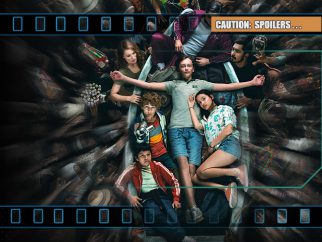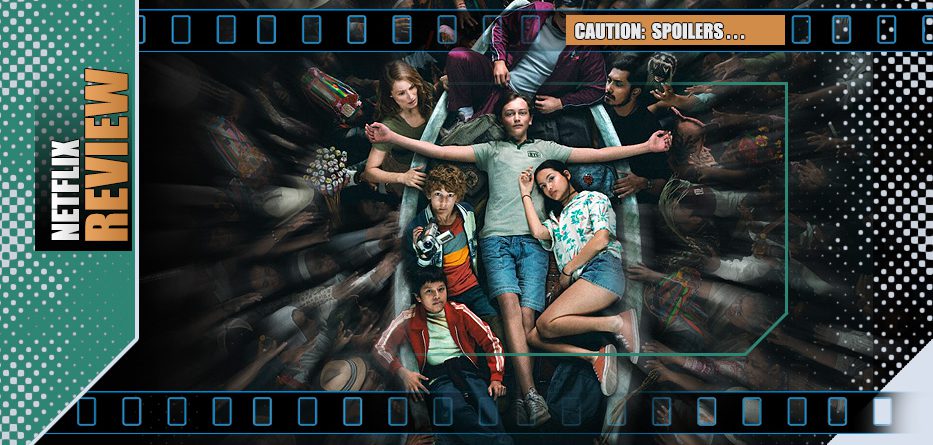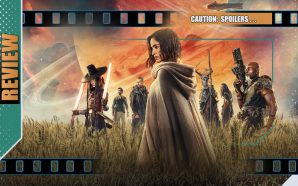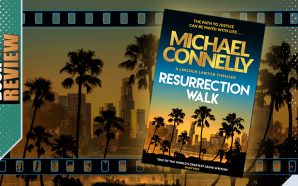Jodi and his mother Sarah have drifted from town to town across South America and Mexico and have settled, for the time being, in a community in Baja, California. Sarah keeps her son medicated and refuses to tell him too much about his early life. But it seems that the past cannot remain hidden and with a series of revelations, it transpires that Jodi has strange abilities, powers that some might consider literally… miraculous. As Jodi’s friends begin to witness those abilities, the dynamics begin to change. Even Jodi himself initially sees them as a way to generate some personal income and money in an area well known for its poverty.
But as interest grows in Jodi and his origins, it attracts those who know more about Jodi’s birth… and those who fear its implications. Sarah is unable to control the adolescent Jodi as his powers and fame increase. But if Jodi really is the new Messiah, he’ll have some very human lessons to learn and the answers will come at a cost involving life and death…
*spoilers*
There are some shows, films, comics and books that grab you right out of the gate and instantly become essential. Mark Millar’s comics have often been the same way: basically take an existing trope or mainstay and say: ‘Yes, but what if we gave that a twist?‘ – knowingly provocative, shamelessly widescreen and ready to engage your love-it/loathe-it tastes like marmite on steroids. In DC Comics‘ Red Son he looked at what might have happened had the infant Superman landed in Russia rather than the American Mid-West. In Marvel‘s The Ultimates he imagined an Avengers wrapped far more closely to political ends and in Nemesis he mused on the idea of a bored billionaire apparently becoming a sadistic super-villain rather than Batman.
So it’s interesting that American Jesus, arguably the most incendiary, clickbait idea – the possibility of the Christian Messiah returning and a young boy beginning to realise his heritage – has just arrived on Netflix as The Chosen One with nary a multimedia ripple compared to recent titles. It comes not with a chorus of holy trumpets nor stormy Revelations-scale foreboding, nor riots in the streets nor the wringing hands of troubled religious groups… but actually with relatively little marketing or fanfare. (Some of the radio silence on its debut may come from the current WGA and SAG strikes, but that only explains part of the equation.) It’s in the form of a mostly-dubbed Mexican serial (aka El Elegido) that initially feels more like a contemporary Stand by Me than the End of Days. And in this case, despite innate intrigue, it doesn’t have that instant must-see factor… even after the first episode, there isn’t really the guaranteed, overt hook to haul you in. In short, it initially feels very, very atypical of the controversial and clickbait-savvy Millar – this is material that’s positively coy about proclaiming any of its core intentions – it’s going to make you wait.
Despite its often-breathtaking cinematography and rich cultural palette, it won’t be for everyone, but in an era where ‘faith’ productions are far more often victims of their own arrogance or bully-pulpit strategies (rather than any direct, sometimes-cited, prejudice), this is a far more subtle story about the nature of faith and destiny (belief, imagery, tradition, community) than one might expect… The Chosen One may cloak itself in the trappings of the church, but it is very much a tale of the human condition…
It’s not the first time that the subject-matter has been tackled. Various novels have mused on the messianic idea and Doctor Who‘s Russell T. Davies had previously cast Christopher Eccleston as a Liverpudlian variant in The Second Coming (2003). But what makes The Chosen One / American Jesus interesting is that it mines a seam that is often glossed over by theologists and anthropologists alike: the difficult teenage years. The average person knows the story of the Nativity, the sermons, the Crucifixion, the Resurrection but the younger years of Jesus Christ remain enigmatic – either little of interest happened or early chroniclers decided it didn’t fit the mission statement. But what would it be like to enter your teenage years and begin to be aware of the power coursing through your veins – and not just metaphorically? Would such a figure be already divine to the point of being dramatically dull, would the act of wondering if he’d be an otherwise normal young man full of the same hormones and foibles be an act of blasphemy or genuine historical and religious interest? Here, moving the setting of the tale to the border areas around Mexico’s Baja California Sur, we have a Jodi who experiences the same quandary and the consequences of not just his heritage but others’ reactions to those possibilities. Even after surviving being nearly flattened by a plummeting juggernaut, the second episode is more about the reactions to that escape then the reasons for it. Jodie and his pals enthrall the local community with tales of miracles, but it’s all more Barnham and Bailey than brimstone and treacle, with the group trying to cash in on their community audience. There are rumbles, literal and metaphorical, but nothing of a truly tectonic variety early on. The Chosen One inches forward, clothing itself in the customs and imagery of the local people, very Catholic-influenced but with their own distinct cultural flavour. The Chosen One may cloak itself in the trappings of the church, but it is very much a tale of the human condition.
Newcomer Bobby Luhnow, who looks uncannily like a young James McAvoy, plays Jodie Christanson and quickly channels that specific gravity of a child just entering the difficult landscape of adolescence – where the opposite sex alternate between being icky or alluring and the summer days are equally filled with seemingly epic quests and mundane duties. He’s a child aware that he’s a little different – his mother has deliberately kept them drifting from place to place, ahead of some unseen oppressive force that could be linked to a misogynistic ex-partner or perhaps (as we slowly discover) something far more insidious. Jodie wants to be like the other kids with whom they’ve settled, but also has to be ready to disappear on a dime – like Sarah and John Connor – into the night less they be terminated or worse. If you went into this series knowing nothing, you’d be getting a Young Adult Narco vibe at best, not something supernatural.
There are only a few known names in the production. Tenoch Huerta (who plays Namor in Marvel‘s Black Panther: Wakanda Forever) is a mysterious man tracking news-stories about miracles and who arrives in the area to study Jodi. Dianna Agron (Glee) is Jodi’s mother Sarah, keeping dangerous secrets about Jodi’s past and fearful of the journey that may lie ahead of them. But most of the cast act as Jodi’s peers. There’s Lilith Curiel, Juanito Anguamea, Patricio Serna Meza, Alberto Pérez-Jácome and Jorge Javier Arballo… all giving impressive performances for their years. (Sadly, two actors, Raymundo Garduño Cruz and Juan Francisco González Aguilar were tragically killed in a car accident near the set which temporarily halted production).
The Chosen One – part of Millar’s ongoing deal with Netflix that has already generated Jupiter’s Legacy and an animated Supercrooks – flies ambitiously against expectations. Despite its often-breathtaking cinematography and rich palette, it won’t be for everyone, but in an era where ‘faith’ productions are far more often victims of their own arrogance or bully-pulpit strategies (rather than any direct, sometimes-cited, prejudice), this is a far more subtle story about the nature of faith and destiny (belief, imagery, tradition, community) than one might expect. The imagery is interesting, the slow-burn story draws you in and the no-easy-answers tone is held tight throughout (even with an ending that some may see coming, even if they aren’t aware of the source material).
It may antagonise some and intrigue others, but there’s little doubt that this is a show that doesn’t shirk its responsibilities nor does it go for the easy answers. Certainly, The Chosen One – adapting only the first volume of Millar’s graphic-novel trilogy – deserves for its testament to be played out further and – based on its first reviews – it looks like a good omen for the future.

- Story9
- Acting9
- Direction9
- Production Design / VFX9











